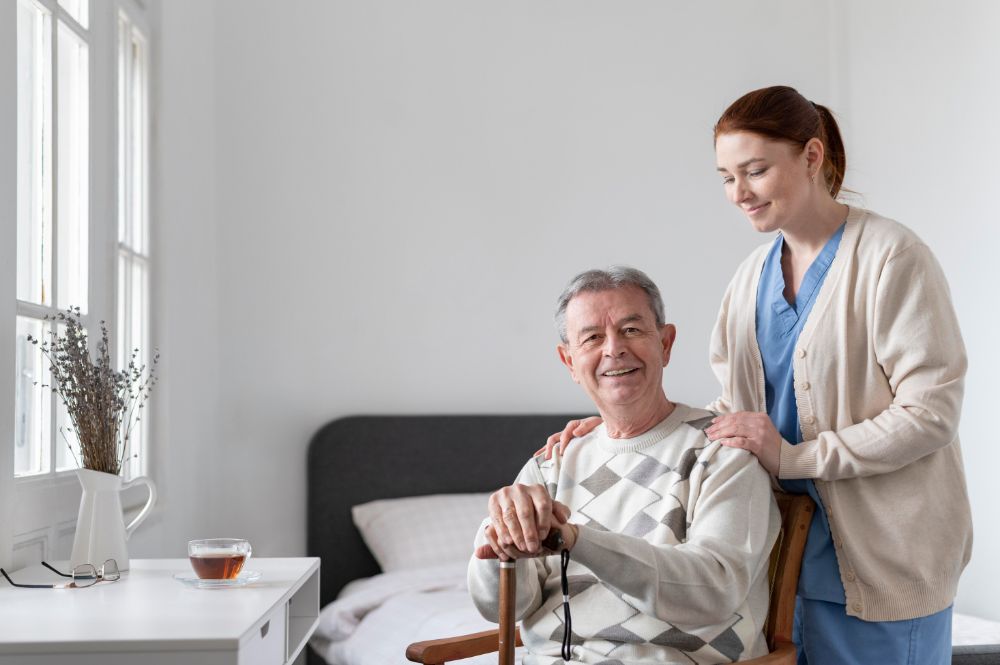What Does Comfort Care Mean?
Comfort care is a type of care focused on providing symptom relief, pain management, and emotional support for patients who are experiencing serious illnesses, often in the final stages of life. At Devoted Helpers in Sugar Land, Texas, we recognize that comfort care is crucial for improving a patient’s quality of life when curative treatments are no longer effective or desired. It is designed to help patients live as comfortably as possible, free from unnecessary pain or distress.
In this article, we’ll explore what comfort care involves, when it’s used, and how it can make a difference for patients and their families.
Key Features of Comfort Care
Comfort care, also known as palliative care in some contexts, focuses on providing relief from symptoms rather than trying to cure the underlying disease. This care may be given at any stage of an illness, but it is particularly associated with the end-of-life phase. Here are the core aspects of comfort care…
Symptom Management
The primary goal of comfort care is to alleviate distressing symptoms such as…
- Pain – Comfort care focuses on managing pain effectively, whether it’s caused by cancer, heart failure, or other chronic conditions.
- Shortness of breath – Breathing difficulties can be alleviated with the help of medications and techniques.
- Nausea and vomiting – These symptoms can be managed with medications or dietary changes.
- Fatigue – Strategies to conserve energy and improve rest are often incorporated.
- Other symptoms – Other symptoms like constipation, insomnia, and anxiety can also be addressed to help the patient feel more comfortable.
Emotional and Psychological Support
Comfort care recognizes that the emotional well-being of patients and their families is just as important as their physical comfort. The emotional and psychological support provided can include…
- Counseling and support for both the patient and family members to help them cope with the emotional challenges of illness and end-of-life care.
- Spiritual care – Spiritual or religious support can be provided according to the patient’s beliefs and preferences.
- Reassurance and guidance – Comfort care providers give guidance to families and patients on what to expect, allowing them to prepare mentally and emotionally for the next stages.
Holistic Care
Comfort care takes a whole-person approach, addressing not only physical symptoms but also emotional, psychological, and spiritual needs. This holistic approach ensures that every aspect of the patient’s well-being is cared for, offering a sense of dignity and peace during challenging times.
Family Support
In addition to caring for the patient, comfort care provides significant support for family members. This includes helping them understand the patient’s needs, answering questions about what to expect, and offering respite care when needed. This support can help reduce the emotional burden on family caregivers, who are often providing round-the-clock care.
End-of-Life Planning
For patients nearing the end of life, comfort care includes planning for the final days. This might involve…
- Discussing advance directives – Comfort care teams help families understand and implement the patient’s wishes, including decisions about resuscitation, life support, and other end-of-life preferences.
- Providing hospice care – When a patient is expected to have six months or less to live, comfort care often transitions to hospice care, which focuses on the patient’s comfort in the final stages of life.
When Is Comfort Care Used?
Comfort care is appropriate when a patient…
- Is facing a serious, chronic, or terminal illness, such as cancer, heart failure, kidney failure, or neurodegenerative conditions like ALS or Parkinson’s disease.
- Has decided not to pursue curative treatments or has exhausted all treatment options and wishes to focus on quality of life.
- Is experiencing significant discomfort from symptoms related to their illness, such as pain, nausea, or fatigue, and needs support managing these symptoms.
While comfort care is most often associated with patients who are at the end of life, it can be provided at any stage of a serious illness. It focuses on improving the patient’s well-being and maintaining dignity, whether the patient is receiving curative treatments or is no longer pursuing aggressive therapies.
Who Provides Comfort Care?
Comfort care is typically provided by a team of professionals who work together to address the patient’s physical, emotional, and spiritual needs. This care team can include…
- Doctors – They help manage pain and other symptoms, adjusting medications as needed.
- Nurses – Nurses provide hands-on care, assist with symptom management, and offer support for both the patient and their family.
- Home Health Aides – They assist with daily activities, like bathing, dressing, and eating, helping the patient maintain dignity and comfort.
- Social Workers – Social workers provide emotional support, help with planning, and assist families with navigating the healthcare system.
- Chaplains or Spiritual Care Providers – For those who desire spiritual support, chaplains can offer counseling and comfort based on the patient’s faith.
What’s the Difference Between Comfort Care and Hospice Care?
While comfort care and hospice care share similar goals of enhancing comfort and quality of life, there are key differences…
- Comfort care can be provided at any stage of a serious illness, even if the patient is still pursuing curative treatments. It focuses on relieving symptoms and improving quality of life throughout the illness.
- Hospice care is a specific type of comfort care that is provided when a patient is nearing the end of life, typically when life expectancy is six months or less. Hospice care is focused on ensuring comfort during the final days, and it involves more extensive end-of-life planning and support for families.
How Comfort Care Improves Quality of Life
Comfort care allows patients to focus on what matters most — their comfort, dignity, and time with family. It ensures that patients are not burdened by unnecessary pain or distress, allowing them to make the most of their remaining time. Whether at home, in a hospital, or in a hospice setting, comfort care provides a peaceful, supportive environment for patients and their loved ones.
At Devoted Helpers in Sugar Land, Texas, we are committed to providing compassionate, high-quality comfort care that improves the lives of patients and their families. Whether you are facing a serious illness or are caring for a loved one, we are here to help ensure comfort, dignity, and peace throughout the journey.


